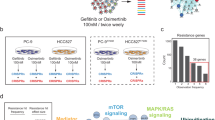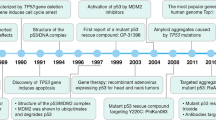Abstract
We have investigated the relationship between the development of tumor resistance towards the cytotoxic action of tumor necrosis factor-α (TNF) and p53 function, using the TNF-sensitive MCF7 human breast adenocarcinoma cell line and two TNF-resistant sublines, MCF7/R-A1 and MCF7/Adr. Use of single-strand conformation polymorphism (SSCP) analysis and DNA sequencing shows that MCF7 has a wild-type p53 gene, whereas both TNF-resistant sublines exhibit mutant p53. This includes a point mutation R280K in MCF7/R-A1 cells, and a point mutation at the splicing acceptor site on the upstream border of exon 5 resulting in a 21 pb deletion in MCF7/Adr cells. These mutations result in loss of p53 capacity to transactivate FASAY (functional assay in yeast). In contrast to what is observed for parental MCF7 cells, treatment of resistant sublines with TNF or γ-irradiation fails neither to induce the expression of the p53-regulated gene products p21waf1/CIP1 and MDM2, nor to arrest the cells in the G1 phase of the cell cycle. Disruption of p53 wild-type function in MCF7 cells by transfection with human papillomavirus type-16 E6 gene, leads to abrogation of the cytotoxic, but not the cytostatic activity of TNF. Altogether, our results strongly suggest that wild-type p53 is involved in cytotoxic action of TNF, and point out that loss of p53 function contributes to resistance of tumor cell to TNF-induced killing.
This is a preview of subscription content, access via your institution
Access options
Subscribe to this journal
Receive 50 print issues and online access
$259.00 per year
only $5.18 per issue
Buy this article
- Purchase on Springer Link
- Instant access to full article PDF
Prices may be subject to local taxes which are calculated during checkout
Similar content being viewed by others
Author information
Authors and Affiliations
Rights and permissions
About this article
Cite this article
Cai, Z., Capoulade, C., Moyret-Lalle, C. et al. Resistance of MCF7 human breast carcinoma cells to TNF-induced cell death is associated with loss of p53 function. Oncogene 15, 2817–2826 (1997). https://doi.org/10.1038/sj.onc.1201445
Received:
Revised:
Accepted:
Issue Date:
DOI: https://doi.org/10.1038/sj.onc.1201445
Keywords
This article is cited by
-
Glucocorticoid-dependent expression of IAP participates in the protection against TNF-mediated cytotoxicity in MCF7 cells
BMC Cancer (2019)
-
Crosstalk between autophagy and epithelial-mesenchymal transition and its application in cancer therapy
Molecular Cancer (2019)
-
Regulatory Crosstalk of Doxorubicin, Estradiol and TNFα Combined Treatment in Breast Cancer-derived Cell Lines
Scientific Reports (2019)
-
Alterations in tumor necrosis factor signaling pathways are associated with cytotoxicity and resistance to taxanes: a study in isogenic resistant tumor cells
Breast Cancer Research (2012)
-
PART 1 – p53 adapted preoperative radiotherapy for T2 and T3 rectal cancer. A study of the p53 research group
European Surgery (2010)



